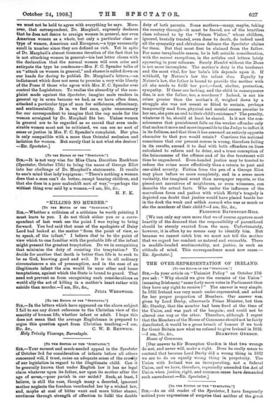LTO Tul ED/TOR OP THIS "SPROTATOR:1 Stn,—Your earnest and much-needed
appeal in the Spectator of October 3rd for consideration of infants before all others concerned will, I trust, rouse an adequate sense of the cruelty of our legislation in regard to the illegitimate child. Can it be generally known that under English law it has no legal claim whatever upon its father, nor upon its mother after the age of seven,—poor pariah in our midst? Such, at least, I believe, is still the case, though many a deserted, ignorant mother neglects the freedom vouchsafed her by a wicked law, and, maybe at cost of bitter want and more bitter shame, 'continues through strength of affection to fulfil the doable duty of both parents. Some mothers—many, maybe, taking the country through—it must be feared, are of the heartless class referred to by the "Prison Visitor," whose children, ignored, brutally treated, even done to death, do indeed need all the sympathy and chivalrous defence the Spectator claims for them. But that must first be claimed from the father. For some inexplicable reason, he is left outside consideration, with the merest exceptions, in the articles and letters lately appearing in your columns. Surely Hamlet without the Dane is not more incomplete. The mother's duty is the tenderest and the most vital, for her babe's life depends upon it. If withheld, by Nature's law the infant dies. Equally by Nature's law, the father is bound to provide the mother with all she needs to fulfil her part,—food, shelter, protection, sympathy. If these are lacking, and the child in consequence dies, is not the father, too, a murderer ? Indeed, is not his crime greater than the mother's if, weighed down by a struggle she was not meant or fitted to sustain, perhaps temporarily mad from physical and mental causes peculiar to her sex, she puts an end to their child's existence ? The penalty, whatever it be, should at least be shared. Is it not the con- sciousness that punishment falls on the weaker offender only that makes it more and more impossible to the Judge to inflict it in its fullness, and that thus it has assumed an entirely opposite character to that you would retain ? Convince the national conscience that our present course is wrong, therefore failing in its results, amend it to deal with both offenders on lines calculated to reform and to deter, and a truer conception of the heinousness of the offence and of its due treatment will thus be engendered. Even-handed justice may be trusted to reduce the crime more effectively than a return to past and one-sided severity. Fiction from the pen of a George Eliot may place before us more completely, and in a sense more veritably, the imagined event than newspaper reports, or the pieced-out narratives of neighbours, or even witnesses, can describe the actual facts. Who under the influence of the marvellous force and pathos with which Hetty's tragedy is depicted can doubt that justice would have placed beside her in the dock the weak and selfish coward who was as much as she the murderer of their child P—I am, Sir, &c.,
FLORENCE DAVENPORT-HILL.
[We can only say once more that we of course approve most heartily of the demand that the responsibility of parenthood should be sternly exacted from the man. Unfortunately, however, it is often by no means easy to identify him. But because we cannot catch him we must not tell the mother that we regard her conduct as natural and excusable. There is muddle-headed sentimentality, not justice, in such an attitude of mind. This correspondence must now cease.— En. Spectator.]














































 Previous page
Previous page